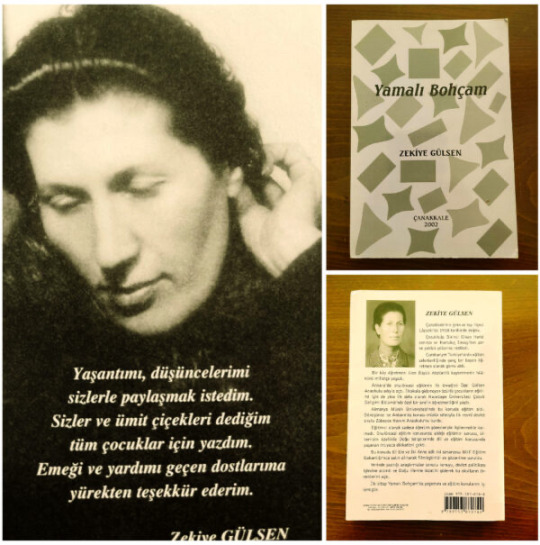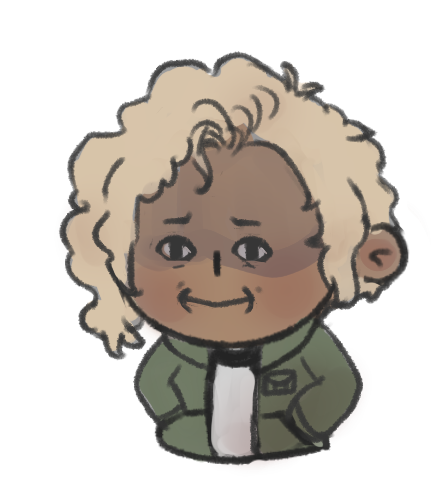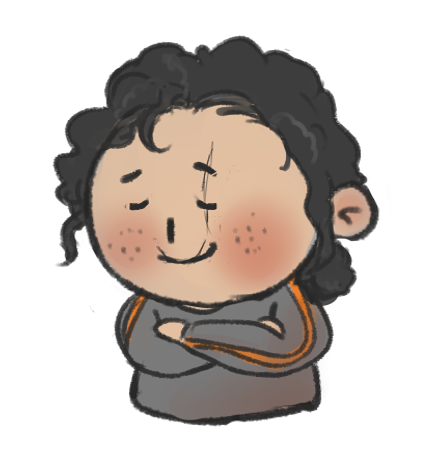#Ana Basri
Explore tagged Tumblr posts
Text
Anas (ra) said that:
"Once I saw the Prophet performing Duha (forenoon) prayer in six units. After that day I never quit that prayer."
The person, who relates this tradition, Hassan Al-Basri(rh), who also had the same sensitivity, said the following:
"After this statement of Anas (ra), I also never quit performing the Duha prayer."
(Tabarani, Awsat, II, 68/1276)
22 notes
·
View notes
Text
Abu Raja' Qutaibah ibn Sa'id narrated to us, from Malik ibn Anas, from Rabi'ah ibn Abi 'Abdur-Rahman, from Anas ibn Malik, that he heard him say:
"The Messenger of Allah, peace be upon him, was neither very tall nor excessively short, neither extremely white nor deep brown. His hair was neither very curly nor very straight. Allah sent him as a prophet at the age of forty, and he stayed in Mecca for ten years and in Medina for ten years. Allah took him unto Him at the age of sixty, and there were not more than twenty white hairs in his head and beard."
Hamid ibn Mas'adah al-Basri narrated to us. Abdul Wahhab al-Thaqafi narrated to us from Hamid, from Anas ibn Malik, who said:
"The Messenger of Allah, peace be upon him, was of medium height, neither tall nor short, with a well-proportioned body."
Mahmoud ibn Ghailan narrated to us. Waki' narrated to us. Sufyan narrated to us from Abu Ishaq, from Al-Bara' ibn 'Azib who said:
"I have never seen anyone with thick curly hair, wearing a red garment, more handsome than the Messenger of Allah, peace be upon him. His hair reached his shoulders, spread evenly across them, neither too short nor too long."
Kitāb al-Shamā'il al-Muḥammadiyyah by Al-Tirmidhī

#holy quran#islam#islamic#islampost#muslim#quran#prophet muhammad#muhammad#seerah#allah#prophet muhammed pbuh#hadith
8 notes
·
View notes
Text
ISLAM 101: AN INTRODUCTION TO HADITH: Part 15
Sila ar-Rahm (Observing Ties of Kinship): Part 2
The rights of parents over their children can be categorized as follows:
a) Rights Pertaining to the Body
If need be, we should carry our parents on our backs. Upon seeing a man with a burden on his back during his circumambulation of the Ka’ba, Hasan al-Basri asked him why he performed this worship with a burden upon his back. The man replied,
“This is not a burden but is my father. I brought him here from Damascus and circumambulated the Ka’ba seven times with him. He taught me my religion and belief. He raised me with an Islamic morality; his rights upon me are great.”
Hasan al-Basri responded,
“If you were to carry him on your back until the Last Day, your labor would go to waste in the event of your breaking his heart only once. Similarly, if you please him even once, it would be equivalent to this much labor.”
All the favors and spiritual degrees that Uways al-Qarani attained are due to his kindness to his mother. Anas ibn Malik relates:
“During the time of Allah’s Messenger, there was a young man by the name of Alqama. He was very pious, spending his time in prayer and fasting. He then fell very ill and, at the subsequent approach of death, became speechless. Being informed of this situation, the Messenger of Allah sent Ali and Ammar ibn Yasir to him. Despite their prompting Alqama to recite the Declaration of Faith, he was unable to do so. When Bilal al-Habashi informed the Prophet of the young man’s predicament, Allah’s Messenger asked, ‘Are either of his parents alive?’
‘O Messenger of Allah, his mother is alive, but she is very aged,’ he was told.
The Prophet then wished to speak with her. When she arrived, he asked her about her son, and she replied:
‘O Messenger of Allah, Alqama is very pious. He is always engaged in worship, but I am displeased with him, as he holds the approval of his wife above mine.’
Allah’s Messenger said,
‘Your displeasure has prevented Alqama’s tongue from pronouncing the Declaration of Faith. Forgive him, so that he may speak.’
When she refused, Allah’s Messenger turned to Bilal and said,
‘Bilal, call for my Companions to go out and gather firewood.’
Upon hearing this, she asked,
‘Messenger of Allah, what do you plan to do with this? Will my child be burnt in the fire? How am I to bear this?’
Allah’s Messenger said,
‘The flames of the Fire are more severe and long-lasting. If you want Allah to forgive him, be reconciled to him. His prayer, fasting, and spending in charity are of no benefit to Alqama so long as you are displeased with him.’
When the elderly woman heard these words, she exclaimed,
‘I call upon Allah and His angels and the Muslims who are present to be my witness that I have forgiven Alqama.’
She then went to her son and heard his voice. He pronounced the Declaration of Faith with ease and passed away that same day. After his burial, Allah’s Messenger addressed his Companions saying,
‘The curse of Allah and the angels is upon the man who favors his wife over his mother.’”
b) Rights Pertaining to the Tongue
We must not even say “Ugh” to our parents.
Not raising one’s voice when speaking with them.
Refraining from excessive speech or exceeding the bounds of propriety while in their presence.
Not favoring one’s wife over them.
Not calling them by their names or interrupting them as they speak.
Avoiding the use of directives such as “Do” or “Don’t”, instead of asking politely.
Obtaining their blessing.
c) Rights Pertaining to the Heart
Having mercy on them, being compassionate towards them. It is stated in a hadith: “Those who show no mercy will be shown no mercy.” (Sahih Muslim)
Love. One must make one’s parents feel loved at all times. Another hadith states: “Kissing the feet of one’s mother is like kissing the threshold of the doorway to Paradise.” (Shir’a)
Sharing their happiness. One must echo their joy when they are pleased with something.
Sharing their sorrow or pain. If they are upset with something, one must strive to convey one’s care and concern.
Being pleased with them. One must seek to attain pleasure in every possible way.
d) Rights Pertaining to Wealth and Property
Preferring one’s parents to oneself in dress and eating and drinking.
Visiting them if they are at a distance: “Whoever believes in Allah and the Last Day, let them maintain the bonds of kinship.” (Sahih al- Bukhari)
Eating together.
Inquiring after their needs and wants and fulfilling these.
Cleaning their homes, undertaking any maintenance required such as painting or other repairs.
Helping them financially. They may be in need of monetary support but may be unable to express this.
Spending freely on them. It is declared in the Qur’an: “Whatever you spend of your wealth is for (your) parents and the near relatives, and (needy) orphans, the destitute, and the wayfarer” (al-Baqarah 2:215). To a person who asked on whom he was to spend, Allah’s Messenger said, “Start with your own self and spend it on yourself, and if anything is left, it should be spent on your family, and if anything is left (after meeting the needs of the family) it should be spent on relatives, and if anything is left from the family, it should be spent like this, like this.” And he was saying: “In front of you, on your right and on your left.”
Inviting them over to share in a meal. This is something that they desire but perhaps cannot articulate.
Being preoccupied with their medical treatment when they fall ill and purchasing their medication. One must strive to care for them themselves instead of hiring a carer to attend to them.
#Allah#god#islam#quran#muslim#revert#revert islam#convert#convert islam#converthelp#reverthelp#revert help#revert help team#help#islam help#salah#dua#prayer#pray#reminder#religion#mohammad#muslimah#hijab#new muslim#new revert#new convert#how to convert to islam#convert to islam#welcome to islam
3 notes
·
View notes
Text

Bir Çanakkaleli Kadının İzinde
✍🏻 Ali Erkan Güneri
https://www.gundemarsivi.com/bir-canakkaleli-kadinin-izinde/
Facebook’ta sevgili arkadaşım Ayşe Gülsen Güçlü’nün sayfasındaki bir paylaşımda annesinin bir kitabından bahsediliyordu: “Zekiye Gülsen – Yamalı Bohçam”. Bir gün araştırmadan sonra bir sahafta kitabı buldum ve aldım. 2016 Yılında Facebook’ta “BİR ABLA-BİR KADIN-BİR İNSAN-BİR ÖĞRETMEN-BİR MİLLETVEKİLİ” başlığı ile bu kitapla ilgili bir yazı paylaşmıştım. “Gündem Arşivi” okurları için bu yazıyı yeniden kaleme aldım ve yazının sonunda da o günlerde yazıya gelen yorumlardan bir seçme yaptım.
Sevgili arkadaşım Ayşe Gülsen Güçlü‘nün annesi, Çanakkale’nin ilk kadın milletvekili Sayın ZEKİYE GÜLSEN’in anılarının yer aldığı 2002 Yılında Çanakkale’de yayımlanan YAMALI BOHÇAM kitabında(*), yazarımız yaşayamadığı çocukluğunu anlatmış, anaokulu ve öğretmen okulu anılarına yer vererek, öğretmenlik günleri, daha sonra özel ana okulu ve bürokratlık günlerindeki deneyimlerini paylaşmış bizlerle. Yalın, çarpıcı, etkileyici bir anlatımla. Okumaktan mutlu oldum, huzur buldum. O günleri yaşatarak yalnız olmadığımızı, çektiği sıkıntıların bizim çalışma hayatımıza benzer ortak sorunlar olduğunu anladım. Bir de bu sorunların, sıkıntıların halen aynen devam ettiğini…
Zekiye Gülsen 1918 Yılında Çanakkale-Lapseki’de doğmuş. “15’inde evlenip 25’inde ölen” bir annenin çocuğu O. Çocukluğu 1.Dünya Savaşı ve Ulusal Kurtuluş Savaşı’nın acılarla dolu, yokluk günlerinde geçmiş. Cumhuriyet Türkiye’sinin bir kadın öğretmeni olarak yaşama başlamış. Ankara’da okul öncesi eğitimin ilk örneği olan Özel Gülsen Anaokulunu daha sonra da ilk resmi anaokulu olan Zübeyde Hanım Anaokulunu Kurucu Müdür olarak hizmete açmış.
Zekiye Gülsen’in YAMALI BOHÇAM’ından bazı bölümler:
“Annemin ölümünden sonra babam bize hem anne hem baba oldu. Hiçbir şeyimizi eksik etmiyor; üstelik de bir kolunu Arıburnu’nda 57. Alayda Mustafa Kemal’in yanında kaybetmiş bir gazi. Böyle bir ortamda nasıl çocuk olacaksınız? O nedenle ben, çocuk olmadan büyüdüm.” diyerek başlıyor.
Babasıyla geçen o günleri anlatırken, “Sarıldım, o da tek koluyla beni sardı, kucakladı. Her zaman babamın kucaklayışında, insanın babasının iki kolu olsa, herhalde kucaklaması daha güzel olur diye içimden geçirirdim. Ama bu sefer öyle düşünmedim. O beyin hiç tanımadığı halde, babama ‘Gazi’ diye hitap edişi çok hoşuma gitmiş, gururlanmış çok sevinmiştim.”, “Biz de bu çarkın içinde yuvarlanıp gidiyorduk. Her geçen gün bir gün evvelkinin aynısıydı. Sabahları kahvaltıdan sonra ablamla ağabeyim okula gider, sonra babam bana, ‘gel bakalım’ der, tek koluyla saçlarımı tarayıp düzeltir ama mümkünü yok öremezdi. Benim bir elim babamın kesik kolu olur, ikimiz el değiştire değiştire bir şeyler yapmaya çalışırdık. Konu komşu ‘Kestiriverin gitsin bu saçları’ dediği zaman kızar, gücenir, ‘Annesinin okşayarak tarayıp ördüğü saçları kesmek doğru olmaz’ ” derdi.
Bu koşullar altında büyüyüp öğretmen olmuştu. “Atatürk’ün, Gazi Mustafa Kemal diye imza attığı, kısa öz, 2-3 satırlık Gazi Hasan Basri diye yazan Teşekkür Belgesi’ne sahipti canım babam.”; “Lâpseki’den Çanakkale’ ye postayı, mektup, paket v.s. her gün Rahman ağabey götürür getirirdi. Ama bugün Rahman ağabey daha keyifli. Arada sırada kamçısını havada sallıyor, ‘haydi aslanlarım’ diye incitmeden atların sırtını okşar gibi vuruyordu. Babam şöyle bir takıldı:
-Rahman bugün pek keyiflisin
-Basri Dayı nasıl keyiflenmem, mahallemizin kızı okumuş öğretmen olmuş Lâpseki’nin en ücra köyüne güle oynaya gidiyor onun sevincine katılıyorum.”
O dönemde “Okulun köşesini dolanıyordum ki karşıma 6-7 yaşlarında, ormanda kaybolmuş karaca yavrusu gibi ürkek okula doğru gelen bir kız çocuğu çıktı. Tane tane örülmüş saçları, sarı kirpiklerle gölgelenmiş iri yeşil gözleri vardı. Aslında çocuğun gözleri mi yeşil, yoksa ormanın, tüm çevrenin yeşili gözlerine mi vurmuştu?” Kısaca aktarmaya çalıştığım bu satırlar özetliyor Zekiye Gülsen’in çabasını. Rahman daha sonrasını görebildi mi bilmem ama bu gurur, bu onur yetiştirdiği çocuklarında da yaşamalı ve ilk kitabın devamı gelmeli, tabi yaşayanlarla. Kitabı okuduğum sırada hep 40 yıllık memuriyet geçmişime gittim, hemen hemen aynı sıkıntıları yaşadığımızı fark ettim. Elbette onuncu döneminde mezun olduğum okulum ve tanıtılması, kabul ettirilmesi gereken mesleğimiz (sosyal hizmet uzmanı) için aynı yollardan geçtik, yeni nesiller de hâlâ aynılarını yaşıyor.
Cumhuriyet’in kazanımlarını koruma yolunda çaba göstermek ve mücadeleye devam etmek gerekiyor. Zekiye Gülsen kitabının sonunu “Yeni umutlarla, yeni ufuklara doğru yürüdüm…” diyerek bitirmiş, bizlerin de mücadelesi, görevi bu olmalıdır. Mustafa Kemal Atatürk’ün Zekiye Gülsen’lerine borcumuzdur bu mücadele…
Ali Erkan Güneri
(*) Yamalı Bohçam – Zekiye Gülsen – 2002
Dönmez Ofset Müze Eserleri Turistik Yayınları
***
BİR ABLA-BİR KADIN-BİR İNSAN-BİR ÖĞRETMEN-BİR MİLLETVEKİLİ
Facebook’ta iki kez paylaştığım bu yazım diğer kişiler tarafından 32 kez paylaşıldı, çok ilgi gördü. Bütün paylaşımları göremiyorum ancak benim ve arkadaşlarımın paylaşım ve yorumlarından bir kısmını buraya aldım. Bazı yorumlardan da ek bilgiler edindim ve sizlerle de paylaşmak istedim…
Yazan okuyan sevgili arkadaşım Esra Güler kitabı güzel anlattığımı, kitabın kendisinin daha ne kadar güzel olduğu düşüncesiyle, yazarın kitabı hangi tarihte yazdığını, hayatta olup olmadığını sormuş yorumunda. 2002’de yayımlanan Yamalı Bohçam’ın o yıllara yakın bir tarihte yazıldığını tahmin ediyorum, çünkü günümüze de göndermeler var. Zekiye Gülsen’i 2013 yılında kaybetmişiz. Zübeyde Hanım Anaokulunun kurucusu olan yazarımız, Hacettepe Üniversitesi ÇGE Bölümü Anaokulunun da öğretmenliğini yapmış. Esra Güler teşekkür ederek “bende okuma isteği oluşturduğuna ve sosyal tarihin bilinmeyen notları gibi bir merak duygusuna kaptırdığına göre amacınıza ulaşmışsınız” diyerek benim düşüncemi desteklemiştir.
“Yamalı Bohçam adlı eseri okudum… Eserle ilgili düşünce, görüş ve duygularımı içeren mektubumu saygı değer büyüğüme vefatı nedeniyle sunamadım.” diyor Kenan Üzmez. Devamla “ana sınıflarının açılması yurt dışı çalışmaları sonunda sayın Zekiye Gülşen’in sayesinde gerçekleşmiştir. Gelibolu-Lapseki arası ilk feribot seferleri de onun eserlerinden birisi… Kendisini minnet duygularımla anıyor, gani gani rahmet diliyorum…” diyor.
Basri Tezel de “Çok şeyi kısacık analiz etmişsin bravo Zekiye Gülsen’in yeğeni olarak herkesin ölmüşlerine rahmet diliyorum.” diyerek desteklemiştir.
Yazar arkadaşım Güven Tunç da “Ne güzel bir yazı olmuş yine… Kitabı söylemiştin Ali Abi hemen edinip okuyacağım. Kitaptaki umuda ihtiyacımız var. Anadolu’ya öğretmenliğe giden genç insanların coşkusuna…” diyerek katkı sunmuş yazıma…
“Teşekkürler Ali Erkan Güneri, ülkemizin karanlık günlerinde annemiz için yazdığınız aydın Türk Kadını örneği.” Gülter Gülsen Yosukaya böyle yazmış.
Yeğeni Sıdıka Tezel Kocaoğlu da “Sevgili halacığım Cumhuriyetin ilk temel taşlarına eğitime katkıda bulunan kadın emekçidir. Halacığımı rahmetle anarken Tüm emekçi kadınların gününü emeklerinin tam karşılığını almalarını dileyerek kutluyorum. Ayrıca halamın kitabını alıntılarıyla hatırlanmasını sağlayan Ali Bey’e teşekkürler.” diye yazıyı paylaşmış…
Kızı Ayşe Gülsen Güçlü ise paylaşımında ve yorumlarında “Sevgili dostum, komşum, arkadaşım Ali Erkan Güneri’nin 8 Mart armağanı”, “Sevgili Ali yüreğine kalemine sağlık. Annem Zekiye Gülsen bu kadar güzel anlatılabilirdi. Teşekkürler.” demiş ve kitabı bulmak isteyenlere “Canım annem onları Türk Anneler Derneği’ne vermişti. Kız çocuklarını okutmak amacıyla kullanılmıştı.” cevabını vermişti.
Arkadaşımız Alev Maro Salarvan ise “Bu güzel anne ışıklarda uyuyordur eminim Ayşe’ciğim… Evet iyi ki var olmuşlar aydınlanmanın kadınları…Ve bizler onlara ne çok özür borçluyuz… Anneciğini saygıyla, sevgiyle anıyorum… Bu arada Ali Erkan Güneri’nin de yüreğine, kalemine sağlık… Böylesi güzel anımsama, anımsatma için…” diyerek duygularını yansıtmıştır.
Figen Baykal ise “Bugün bu kadar güçlü kadınlar olabilsek belki de çok şeyi değiştirebilirdik.” yorumuyla dikkat çekti.
Sevgi Doğan ise “Önce yazınız için kaleminize, yüreğinize sağlık. Dürüst, çalışkan ve 3 dönem millet vekilliği yapmış çocuklarının yakınlarının boğazından bir lokma haram yedirmemiş bir insandı. Sadece halk için çalıştı şimdiki millet vekilleri gibi mal mülk edinmemiş örnek bir insandı. Işıklar içinde huzurlu yatsın. Mekânı cennet olsun teyzemin.” yorumu ile katkı vermiştir.
Erman Ertung: “Ne mutlu bana ilkokulda öğretmenim oldu… Türk Kadınının hası idi…”
Semra Caner: “…Gerçekten çok duygulandım. Senin mütevazı kişiliğinin altında yatan değerler seni de değerli kılıyor. Böylesi bir annenin evladı olmak gurur verici…”,
Mahmut Öktem: “Kalemine sağlık Ali. Sevgili Zekiye Hanımı görme şerefine eriştiğim için kendimi mutlu hissediyorum.”
Nurçin Merter: “Saygıdeğer bir annenin kızını tanımış ve arkadaş olduğum için kendimi mutlu hissediyorum…”
Ali Erkan Güneri
#YamalıBohçam #Kitapİncelemesi #KurtuluşSavaşı #CumhuriyetDönemi #Örnekİnsan #Biyografi #TürkiyedekiGüçlüKadınlar #TürkiyedeÖncüKadınlar #TürkiyedekiAnaokullarınınİlkAçılması #ZekiyeGülsen
0 notes
Text
Tafsir Ibn Kathir: Surah Al-Hijr Ayah 10-13
In the Name of Allah, the Most Gracious, the Most Merciful.
15:10 Indeed, We sent (Messengers) before you (O Muhammad) amongst the earlier communities.
15:11 And there never came a Messenger to them but that they mocked him.
15:12 Thus We allow it to enter the hearts of the guilty.
15:13 They would not believe in it (the Qur'an); and already the example of the ancients has gone forth.
The Idolators of Every Nation made a Mockery of their Messengers
Allah says,
Indeed, We sent (Messengers) before you (O Muhammad) amongst the earlier communities. And there never came a Messenger to them but that they mocked him.
Consoling His Messenger for the rejection of the disbelieving Quraysh, Allah says that He has sent Messengers before him to the nations of the past, and no Messenger came to a nation but they rejected him and mocked him.
Then He tells him that He lets disbelief enter the hearts of those sinners who are too stubborn and too arrogant to follow His guidance.
Thus We allow it to enter the hearts of the guilty.
Anas and Al-Hasan Al-Basri said that this referred to Shirk.
They would not believe in it (the Qur'an);
and already the example of the ancients has gone forth.
meaning the destruction wrought by Allah on those who rejected His Messengers, and how He saved His Prophets and their followers in this world and in the Hereafter, is well known.
0 notes
Text
﷽
➖➖➖
LOVE FOR PROPHET MUHAMMAD ﷺ
➖➖➖
A Criteria for True Faith
➖➖➖
Allah ﷻ says in the Qur'an:
قُل إِن كُنتُم تُحِبُّونَ اللهَ فَاتَّبِعُونِي يُحبِبكُم اللهُ
Say if you Love Allah then follow me, Allah will love you.
[3:31]
Hasan Al Basri رحمه الله called this Ayah the Ayah of testing.
It tests the believers, that if they truly love Allah ﷻ, they will follow Muhammad ﷺ.
_
Anas ibn Malik رضي الله عنه reported: The Messenger of Allah ﷺ said, “None of you have faith until I am more beloved to him than his children, his father, and all of the people.”
[Sahih al-Bukhari 15, Sahih Muslim 44]
_
Narrated Abdullah bin Hisham رضي الله عنه:
We were with the Prophet ﷺ and he was holding the hand of Umar bin Al-Khattab.
Umar said to Him, "O Allah's Messenger (ﷺ)! You are dearer to me than everything except my own self."
The Prophet ﷺ said, "No, by Him in Whose Hand my soul is, (you will not have complete faith) till I am dearer to you than your own self."
Then Umar (رضي الله عنه) said to him, "However, now, by Allah, you are dearer to me than my own self."
The Prophet (ﷺ) said, "Now, O Umar, (now you are a believer).
[Sahih Bukhari 6632]
_
A major aspect of having Ihsaan, (the highest level of Imaan) is to love the Prophet ﷺ unconditionally above everyone else!
_
In a hadith narrated by Anas رضي الله عنه:
A man asked the Prophet (ﷺ) about the Hour (i.e. Day of Judgment) saying, "When will the Hour be?" The Prophet (ﷺ) said, "What have you prepared for it?" The man said, "Nothing, except that I love Allah and His Apostle." The Prophet (ﷺ) said, "You will be with those whom you love."
[Sahih al-Bukhari 3688]
_
The Sahaba رضي الله عنهم rejoiced like never before because of this Hadith!
Because of their complete love!
_
May Allah ﷻ make us among those love Him and His Messenger ﷺ and gather us among the righteous in the Hereafter.
آمِيْن
0 notes
Text
Neyi Kaybettiğinizi Hatırlayın!
Ahlak yoksa, namaz yoksa, haram-helal hassasiyeti yoksa, kul ve kamu hakkı bilinci yoksa, ana-babaya hürmet, eşe nezaket yoksa, dili gıybet ve iftiradan, gözü haramdan, kalbi hasetten, mideyi haksız kazançtan, cebi faizden korumak yoksa, hangi partiden, cemaatten ve tarîkatten olursanız olun sonuçta kaybedenlerden olacağınızı asla unutmayın!
Çünkü yaşanmayan ve yalnızca ideolojik bir mensubiyete dönüşen bir inancın ne bu dünya da ne de ahirette size hiçbir faydası olamaz…
Kalbinize vakit ayırın!
Uzun süredir namazlarınızdan tat alamıyorsanız, okuduğunuz Kur’an kalbinize etki etmiyorsa, şöyle gönülden bir dua yapamıyorsanız, dinlediğiniz sohbetler ve nasihatler kulaklarınızı aşıp da bir türlü kalbinize ulaşamıyorsa ya ruhunuzu ihmal ediyorsunuz ya da ibadetin ruhunu kaybetmişsiniz demektir.
Hasan el-Basri diyor ki; “Üç şeyde tadı kaybedene kapı kapalıdır: zikirde, namazda ve Kur’an tilavetinde.” O halde kapıyı açmak için çabalayın! Kapıyı açacak olan samimiyettir. Önce rabbinize karşı samimi olun ki, tüm kapılar ardına kadar açılsın.
Bazı hesapları Allah’a bırakın!
Her kalp kırıklığının hesabını sormaya kalkmayın! Her iyiliğin karşılığını hemen beklemeyin! Çünkü bu dünya her kötülüğün hesabının sorulacağı ve her iyiliğin karşılığının tastamam alınacağı bir yer değildir.
Bazı hesapları Allah’a ve ahirete bırakın! İmam Şâfiî diyor ki: Kur'an'da öyle bir ayet vardır ki zalimin kalbine saplanan bir ok, mazlumun kalbine sürülen bir merhem gibidir. İşte o ayet; "Senin Rabbin hiçbir şeyi unutacak değildir." (Meryem, 64) ayetidir. Rahat olun! Ve bazı şeyleri Rabbimizin her hesabı soracağı ve her iyiliğin karşılığını vereceği güne erteleyin.
Allah’a teslim olarak özgürleşin!
Tüm korkularınızdan, kaygılarınızdan, endişe ve evhamlarınızdan Allah’a güvenerek kurtulun. Ecelin de rızkın da Allah’ın elinde olduğunu sakın unutmayın ve bilin ki gerçek özgürlük yalnızca âlemlerin rabbi olan Allah’a güvenmektir. Çünkü Efendimiz (s.a.s) buyuruyor ki; “İnsan kime ümit bağlamışsa ona havale edilir. Ümidini Allah'a bağlayanın işi ise yalnızca Allah'a aittir. İnsana ancak korktukları musallat edilir. Yalnızca Allah'tan korkana ise Allah hiç kimseyi musallat etmez” (Camiussağir, 2609)
Yaptığınızı yalnızca Allah için yapın!
Bir iş Allah için yapılmışsa, boşa yapılmış bir iş yoktur, heba edilmiş bir mal yoktur, israf edilmiş bir zaman yoktur, boşa akıtılmış bir damla ter yoktur, boşa konuşulmuş tek bir kelime yoktur.
Eğer Allah için olduğuna inanıyorsan kim ne derse desin sen inandığını söyle ve inandığının peşinden git. Çünkü Efendimiz (s.a.s) buyuruyor ki; “Allah'a ibâdet et ve Ona hiçbir şeyi ortak koşma. Kur'ân'ın gittiği tarafa sen de git. Küçük veya büyük olsun, kimden gelirse gelsin hakka yönel. İsterse bu kişi kızdığın ve sana uzak olan biri olsun. Küçük veya büyük kimden gelirse gelsin, bâtılı reddet. İsterse bu kişi sevdiğin ve akraban olan biri olsun.” (Camiussağir, 1134)
O büyük güne hazırlanın!
Dünyalık koşuşturmaların, siyasi ve ekonomik tartışmaların, geçici gündemlerin size ahireti unutturmasına asla izin vermeyin. Hayırdan hiçbir şeyi küçük görmeyin. Biriktirin çünkü cennet ancak küçük küçük biriktirilir.
Bazen az bir sadaka, bazen bir iyiliği tavsiye, bazen bir garibin duası, bazen anne-babaya hürmet, bazen eşe karşı güzel bir ahlak, hepsi cennet birikimidir. Biriktirin ve yarın için ne gönderdiğinize muhakkak bakın! Rabbimiz buyuruyor ki; "Kendiniz için önceden ne hayır gönderirseniz Allah katında onu bulacaksınız" (Bakara, 110)
Unutmayın! Her hain bakışın, göğüslerde gizlenen her sırrın, günaha meyleden her duygu kıpırtısının, kalplerde saklanan her hile, plan ve stratejinin hesabının verileceği bir güne ilerliyoruz. Çünkü bizim Rabbimiz "Gözlerin hain bakışlarını ve kalplerin ne gizlediğini bilir" (Mümin 19)
Dr. Abdulaziz KIRANŞAL
0 notes
Text
Towards the end of the first century A.H., all of the companions had departed except one or two. Their students were scattered all around in many countries extending from India in the east to Spain in the west. Scholars in major cities were mainly following the teachings and opinions of the most knowledgeable companions who lived and taught in their cities. Some scholars traveled to the famous learning centers (Makkah, Madinah, Kufa, and Basra) seeking to learn from the followers living there. Later on, they returned to their homelands and transferred the knowledge they acquired. The end product was a huge scattered unclassified compilation of prophetic traditions, alongside explanations and opinions given by the companions and their students from the 2nd generation. Many discussions were made about all sorts of things: verses from the Qur’an, prophetic traditions, rituals and rites, obligations and prohibitions, spiritualties and materialism, and finally, the creed of faith. It was during one of the lessons given by Al-Hassan Al-Basry that one of his students debated with him about the Muslim who commits major sins (i.e. Adultery, backbiting, etc.), whether he or she should be considered a Muslim or not, and whether he shall be admitted into heaven or not. Al-Hassan saw that this person is still a Muslim and shall be recompensed according to all of his or her deeds, the good ones and the bad; if Allah wills, He shall forgive him, and if He wills, He shall punish him and later on admit him into heaven for being a believer. The student whose name was Wāsel Ibn ‘Ata’ (80-131 A.H.), rejected this opinion and said that the Muslim who commits major sins is a dissolute, he is neither a Muslim who has sincerely submitted to Allah nor a non-Muslim who disbelieved in Allah, but in a middle rank between having faith and disbelief; if he or she dies without sincere repentance, then he shall be admitted into the hellfire and shall never be forgiven. After rejecting his opinion, Wāsel retired from Al-Hassan’s educational class, and formed a group along with those who accepted his creedal views. They were called “The Nonconformists” (Al-Mu‘tazilah). Their creedal opinions were later on highly accepted by many Muslim scholars, and became the officially adopted opinion of the state during the first century of the ‘Abbāsid Caliphate. Meanwhile, with the rapid increase in the numbers of Muslims, the issues and questions about the Islamic rituals and the daily life practices increased. Whenever the need for advisory opinions from well learned jurists increased, the people sought the most notable and promising scholar in their city. Families started sending their children to learn about Islam at scholars’ hands; consequently, coteries started to form and grow inside almost every Islamic city. These coteries grew into communities, and the fame they scored depended on the number of their members and their efforts in spreading the opinions they learned from their Imams. Now the evolution of different schools of thought (Madhāheb fiqheyah) was something inevitable. Before the middle of the 2nd century, several schools of thought had already been formed by the intelligent scholars of the 4th generation. Among them are: 1. The school of Imam Abu Hanifah (80-150 A.H.) was domineering in Kufa. 2. The school of Imam Mālek Ibn Anas (93-179 A.H.) in Madinah. 3. The school of Imam Al-Awza‘i (87-157 A.H.) in Sham. 4. The school of Imam Al-Layth Ibn Sa‘d (94-175 A.H.) in Egypt. Other schools of thought were formed during that time but they didn’t have a huge number of followers and were never domineering. E.g., the school of Imam Zayd Ibn ‘Ali (76-122 A.H.), and the school of Imam Sufyan Ath-Thawri (97-161 A.H.).
0 notes
Text
One of the most remarkable hadiths al-Bukhari narrated in his Sahih is from al-Hasan al-Basri, from Anas, from the Prophet -- Allah bless and greet him -- who related that after Allah allows him to intercede for the dwellers of the Fire, Allah shall say: "By My Power, by My Majesty, by My Supremacy, and by My Greatness! I shall take out of the fire whoever said:��la ilaha illallah.
0 notes
Photo


320 notes
·
View notes
Photo


obsessed with this look
339 notes
·
View notes
Photo



hold on im shifting into avatar mode
#atla au#mara don#art#also lol uh who do i have 2 tag#jie-sun#ana basri#angelo brown#burger:)#kissingagrumpygiant#nlarz#saturnsage#sorry mara doesnt have cool monk robes he hates his body:)#oc
1K notes
·
View notes
Photo

don’t eat the avatar’s ramen, kids
#SGLKSAHG I'M SORRY AGAIN#draw ana for the first time... meme#draws stella in avatar state for the first time.... also meme#this background doesn't even make sense but I'M LAZY#Ana Basri#kissingagrumpygiant#Stella Han#atla au#lydiaalin
855 notes
·
View notes
Photo




angelo airbender studies + airbender gaang 💨💨💨
#atla au#fallen hero: rebirth#ana basri#mara don#oc: angelo#yes they're airbenders#yes they're not bald#they exist#my art
792 notes
·
View notes
Text
Tafsir Ibn Kathir: Surah Hud Ayah 106-107
In the Name of Allah, the Most Gracious, the Most Merciful.
11:106 As for those who are wretched, they will be in the Fire, in it they will experience Zafir and Shahiq.
11:107 They will dwell therein for all the time that the heavens and the earth endure, except as your Lord wills. Verily, your Lord is the doer of whatsoever He intends (or wills).
The Condition of the Wretched People and their Destination
Allah, the Exalted, says,
As for those who are wretched, they will be in the Fire,
Then Allah explains the situation of the wretched people and the happy people.
He says,
in it they will experience Zafir and Shahiq. Ibn Abbas said,
"Az-Zafir is a sound in the throat and Ash- Shahiq is a sound in the chest. This means that their exhaling will be Zafir and their inhaling will Shahiq.''
This will be due to the torment that they will be experiencing. We seek refuge with Allah from such evil.
They will dwell therein for all the time that the heavens and the earth endure,
Imam Abu Jafar bin Jarir said,
"It was from the customs of the Arabs that when they wanted to describe something that would last forever, they would say, `This is as enduring as the heavens and the earth.'
Or, `It will last as until the night and day separate.'
They would say, `As long as talkers at night continue to chat.' They meant by these statements the condition of eternity. Therefore, Allah addressed them in a manner that they were familiar with among themselves. Thus, He said,
They will dwell (therein for all the time that the heavens and the earth endure).
The literal meaning is also intended with; "for all the time that the heavens and the earth endure.''
This is due to the fact that there will be heavens and earth in the life of the next world, just as Allah said,
On the Day when the earth will be changed to another earth and so will be the heavens. (14:48)
For this reason, Al-Hasan Al-Basri said concerning the statement of Allah, (the heavens and the earth endure),
"Allah is referring to a heaven other than this heaven (which we see now) and an earth other than this earth. That (new) heaven and earth will be eternal.''
Concerning Allah's statement,
except as your Lord wills. Verily, your Lord is the doer of whatsoever He intends.
This is similar to His statement,
The Fire be your dwelling place, you will dwell therein forever, except as Allah may will. Certainly your Lord is All-Wise, All-Knowing. )6:128(
It has been said that the exception mentioned in this verse refers to the disobedient among the people of Tawhid. It is these whom Allah will bring out of the Fire by the intercession of the interceders.
Those who will be allowed to intercede are the angels, the Prophets and the believers. They will intercede even on behalf of those who committed major sins. Then, the generous mercy of Allah will remove from the Fire those who have never done any good, except for saying La ilaha illallah one day of their life.
This has been mentioned in numerous authentic reports from the Messenger of Allah, including narrations from Anas bin Malik, Jabir bin Abdullah, Abu Sa`id Al-Khudri, Abu Hurayrah and other Companions.
No one remains in the Fire after this final intercession, except those who will remain there forever without escape. This is the opinion held by many of the scholars, both past and present, concerning the explanation of this verse.
0 notes
Photo







sidestep emotes :D
87 notes
·
View notes